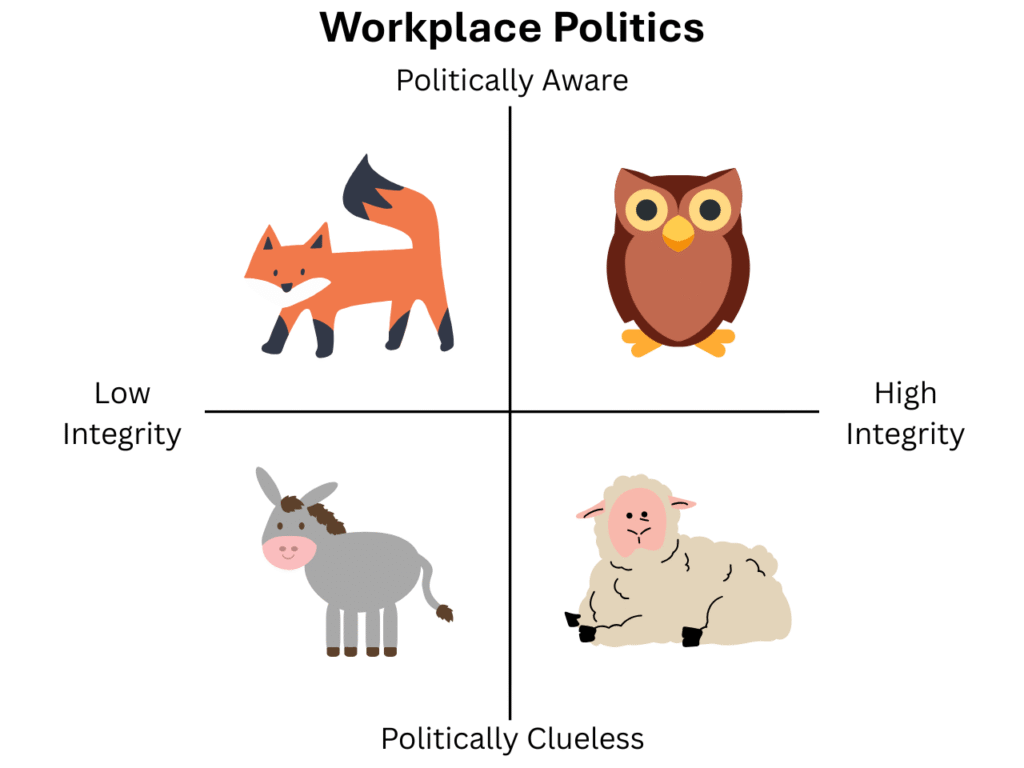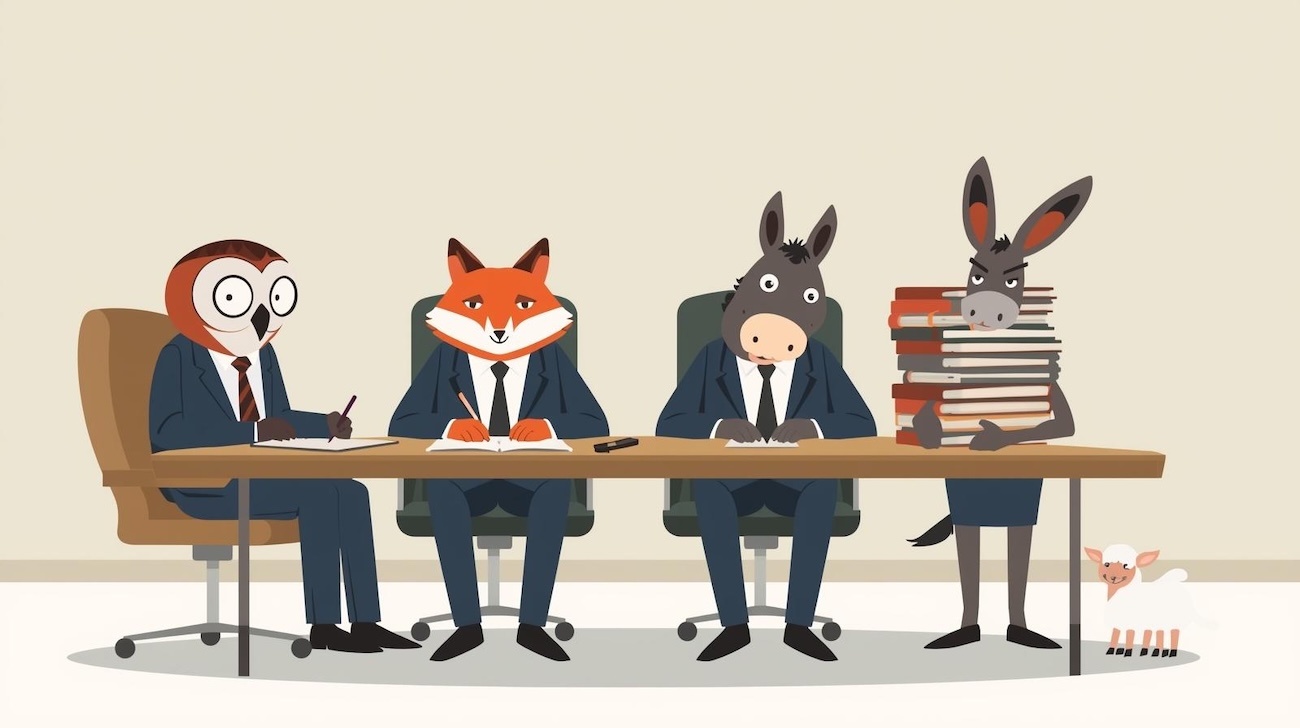On this blog I’ve been slowly dishing out the cheat codes I’ve picked up over the years. First up: self-awareness – which, let’s be honest, is basically not being the person who microwaves fish at work. Do that once, and you’ll never get promoted again, because everyone in the office will know you as Dave the Hake Guy. Then we covered feedback – that thing everyone says they want until it arrives and they look like a cat being sprayed with a garden hose.
And now the big one: office politics – how it shapes trust in the workplace, workplace culture, and whether you thrive in your team dynamics or get steamrolled by a Fox.
The sandpit problem
Trust is the thing every manager prays for – inside their team and across departments. At best, you’re all sculpting something magnificent together: a sandcastle so impressive toddlers weep. At worst, you’re pelting each other with damp clumps and sobbing to HR that “Johnny made me eat sand again.”
And here’s the kicker: the bigger the team, the faster trust in the workplace evaporates. Suddenly KPIs become dragon’s treasure, hoarded and defended. Nobody cares about the business anymore; they care about their shiny coin pile. And that’s when the Foxes show up – those slick, grinning opportunists who thrive in chaos and leave behind workplaces that smell like a forgotten lunchbox.
What the Navy knows
Simon Sinek tells a story from the Navy SEALs in The Infinite Game. The SEALs – the world’s most elite frogmen who can probably kill you with a spatula, measure only two things: Performance and Trust.
- Performance – how good you are at the job (are you competent, gritty, able to sprint in flippers).
- Trust – your character, humility, and whether you have your teammates’ backs when bullets start flying.
One SEAL famously said: “I may trust you with my life, but do I trust you with my money or my wife?” That’s not a line you forget.
Their rule? They’d rather have a medium performer with high trust than a high performer with low trust. Because one rogue agent doesn’t just mess up the spreadsheet; they get the whole squad killed.
And here’s where it lands: what the SEALs are really describing is the difference between physical safety and psychological safety.
Psychological safety gets dismissed in offices as “woke.” But imagine telling a Navy SEAL, mid-firefight, that psychological safety is optional. Chances are, you’ll wind up in the Emergency Room being interrogated as to why you chose to use a spatula as a suppository.
Office politics and trust in the workplace are binary
Here’s the brutal bit: trust is not a dimmer switch. It’s binary.
There is no “medium trust.” You don’t slide from high to “a bit shaky.” You drop, instantly.
It’s like a parachute – it either opens or it doesn’t. Or like a glass mug – one crack and everyone’s checking for leaks.
At work, you can build trust in the workplace for years, but throw a colleague under the bus once in a meeting and your account resets to zero. Overnight, your jokes stop landing, your promises sound hollow, and your victories are audited harder than a dodgy expense claim involving “team morale tequila.”
And clawing your way back makes growing hair on a bowling ball look easy.
Integrity in action
Everyone loves to claim they “have integrity.” Great. But integrity isn’t about what’s printed on your LinkedIn banner. It’s tested in the moments when the flames are licking at your trousers.
- Do you quietly take credit for work you barely touched?
- Do you casually shove a colleague under the bus the moment feedback stings?
- Do you clam up when transparency is needed, hoping someone else will fall on the grenade?
That’s when we see whether “integrity” is a sticker on your laptop or the real thing.
Office politics and the animals you work with
Cambridge gave me a tidy two-axis framework: Integrity (high ↔ low) and Political Awareness (clueless ↔ cunning). Out pops a zoo that looks suspiciously like your last team meeting: Owls, Foxes, Donkeys, and Lambs.

- Owl – high integrity, politically aware. The wise ones. When things go wrong, they’ll say: “We tried, we failed, but we learnt something.” When things go right, they hand the credit to the team. They’re the workplace equivalent of airbags: you hope you don’t need them, but when everything goes sideways, they stop you smashing your face into the dashboard.
- Fox – politically sharp, low integrity. Loves the spotlight when things go well, but the moment things wobble it’s “Not my fault, Andrew didn’t get it done.” They claim credit like seagulls claim chips on a beachfront: loudly, aggressively, and with no shame whatsoever. When things implode, you can set your watch by how fast they’re underlining someone else’s name in red on the blame report.
- Donkey – high integrity, politically unaware. Dependable workhorses carrying the load while being as politically aware as a cactus. They do three people’s jobs, drink five people’s worth of coffee, and still get overlooked for promotion because the Fox is too busy turning a PowerPoint transition into a TED Talk.
- Lamb – low integrity, low awareness. Adds little value, gossips like it’s an Olympic sport, and vanishes when accountability shows up. When restructuring comes, they’re always first in line for the exit – bleating in surprise as if nobody could have seen it coming. They’re the human equivalent of wallpaper: bland, vaguely annoying, and destined to be stripped out sooner or later.
And here’s the important bit: “Good politics is about doing things correctly and fairly in the interest of the group and the overall vision, whereas bad politics is about acting out of self-interest.” Politics isn’t the enemy – the type of politics is.
If the Navy won’t stick a Fox on a SEAL squad, why do we keep sticking them in charge of departments?
For more on dealing with these types in the workplace, I highly recommend this excellent piece from Thinking Focus: Politics in the workplace – dealing with Sheep, Donkeys, Foxes, and Owls.
How trust in the workplace gets destroyed
Trust rarely dies in one spectacular betrayal. It dies like bad plumbing – drip by drip:
- The manager who takes a bow when the team wins and finds a sacrificial intern when it fails.
- Rules that apply only when the boss is in a good mood.
- Decisions made in secret, dumped on the team with a chirpy “sorry, urgent.”
- Gossip spreading like an un-flushed toilet.
- Feedback that only arrives when you screw up – never when you nail it.
These cracks in workplace culture and team dynamics build up until you suddenly find yourself in a toxic workplace. Each little leak erodes the floor until one day the whole thing collapses.
(If you want more reading on this slow-drip erosion of trust, see: Ten ways we destroy trust at work.)
The long game of office politics and trust
Here’s the score: Foxes can bag promos, bonuses, and enough LinkedIn humblebrags to make you choke on your soy latte. But their success is Monopoly money – it looks impressive until you try to spend it in the real world. Life is long (hopefully), and the colleagues you steamroll today may be the exact people standing between you and professional face-plant tomorrow.
If people can trust you now, they’ll back you later. If they can’t, no amount of wizardry, buzzword salads, or “synergy strategy frameworks” will save you.
And for managers, here’s the bitter pill: if you keep promoting high performers with the integrity of a damp Weet-Bix, you’re broadcasting to your team that performance trumps trust every time. Don’t act surprised when the day comes that you need them to rally and they’re all quietly watching you sink – popcorn in hand.
So loop back: self-awareness is the foundation, feedback is the scaffolding, and trust is the cement. Without that cement, the scaffolding doesn’t just collapse; it buries you in a heap of bent metal, bruised egos, and half-finished PowerPoints.
Where do you fit in this office zoo? Owl, Fox, Donkey, or Lamb? Drop it in the comments – or anonymously, if you think you might actually be the Fox.

2 Responses
[…] Stanford psychologist and pioneer of the Growth Mindset, whose work underpins modern thinking about growth mindset in organisations. She […]
[…] the office politics and trust blog, I described the Fox – politically sharp, low on integrity, optimising for personal […]